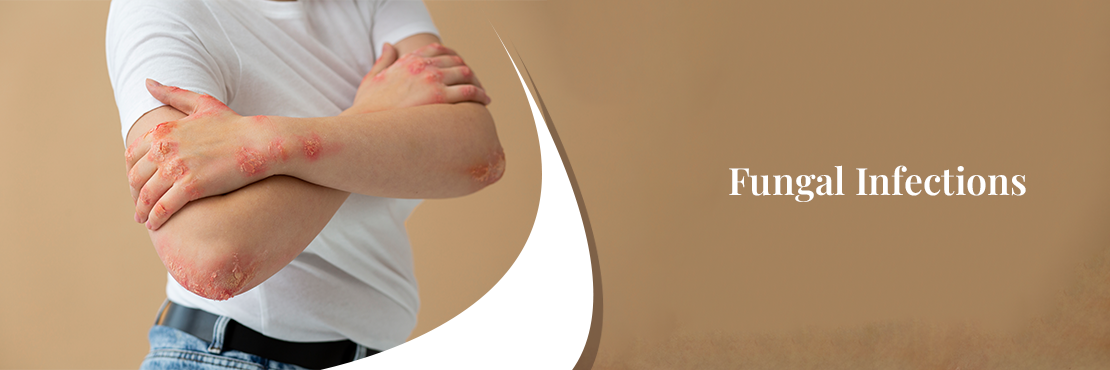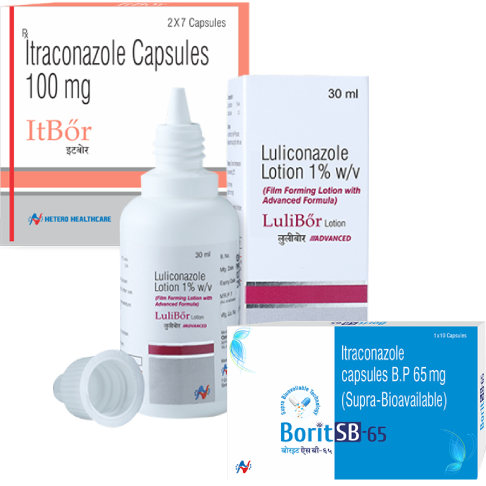Fungal Infections

Fungal infections are common throughout much of the natural world. In humans, fungal infections occur when an invading fungus takes over an area of the body and is too big for the immune system to handle.
Types of Fungal Infections:
Superficial: Affect skin – mucous membrane
Tinea versicolor
Dermatophytes: affect the keratin layer of skin, hair, and nail. e.g., tinea pedis, ringworm infection
Candidiasis: Yeast-like, oral thrush, vulvovaginitis, nail infections.
Deep Infections: It affects internal organs such as the lungs, heart, and brain, leading to pneumonia, endocarditis, and meningitis.
Dermatophytosis (Tinea) Types:
The most common types of ringworm include the following:
- Athlete's foot (tinea pedis); This common condition primarily affects teen and adult males. It affects children before puberty less often. Contributing causes include sweating, not drying the feet well after swimming or bathing, wearing tight socks and shoes, and warm weather conditions. Symptoms of athlete's foot may include:
- Whitening of the skin between the toes
- Scaling of the feet
- Itchy rash on the feet
- Blisters on the feet
- Jock itch (tinea cruris); Ringworms may be hard to cure. This condition is also more common in males and happens more often during warm weather. It is very rare in females. Symptoms of jock itch may include:
- Red, ring-like patches in the groin area
- Itching in the groin area
- Pain in the groin area
- It does not usually involve the scrotum.
- Scalp ringworm (tinea capitis); Scalp ringworm is highly contagious, especially among children. It happens mainly in children between the ages of 2 to 10. It rarely happens in adults. Symptoms of scalp ringworm may include:
- Red, scaly rash on the scalp
- Itching of the scalp
- Hair loss on the scalp
- Rash elsewhere on the body
- Nail infection (tinea unguium); An infection of the finger or toenail, this type is characterized by a thickened, deformed nail. This condition more often affects the toenails than the fingernails. It happens more often in adolescents and adults rather than young children. Symptoms of nail ringworm may include:
- Thickening of the ends of the nails
- Yellow color to the nails
- Body ringworm (tinea corporis); This skin infection is characterized by a ring-like rash anywhere on the body or the face. It happens to all ages but is seen more often in children. It is more common in warmer climates. The symptoms of body ringworm may include:
- A red, circular lesion with raised edges
- The middle of the lesion may become less red as the lesion grows.
- Itching of the affected area
How can fungal infections be prevented?
Good hygiene is also critical for avoiding fungal infections.
Try to:
- Keep your skin clean and dry, particularly the folds of your skin.
- Wash your hands often, especially after touching animals or other people!
- Avoid using other people's towels and other personal care products.
- Wear shoes in locker rooms, community showers, and swimming pools
- wipe gym equipment before and after using it.
If the fungal infections do not suffice despite taking all the precautions, it is time to seek medical attention.
These medicines help control fungal infections.
These medicines act, speed up the healing process, and stop the growth of fungi, thereby restricting fungal infections. Use these medicines as prescribed by your medical professional.
Complete the given course of tablets to prevent the infections from returning.
Itbor: It is composed of Itraconazole as its active component. It is an oral treatment that interferes with the formation of the fungal cell membranes during the step of ergosterol biosynthesis and inhibits fungal growth.
Lulibor: Lulibor contains Luliconazole, an imidazole antifungal agent. It is antifungal, anti-inflammatory, anti-itch, and non-steroidal and is used in various fungal infections like Tinea cruris, tinea corporis, and tinea pedis.
Borit: It Is composed of Supra Bioavailable Itraconazole capsules that improve the dissolution rate of Itraconazole and is used to treat various Dermatophytosis infections.

